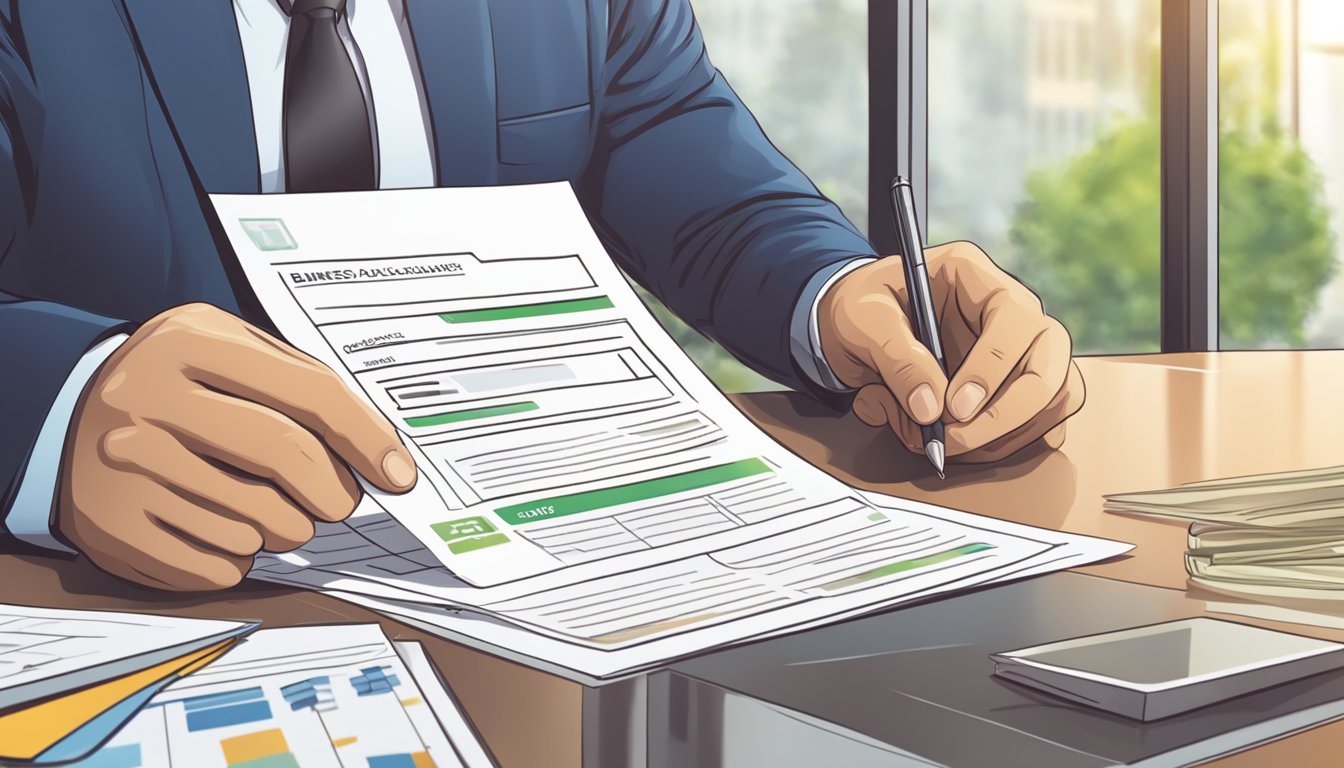If you’re a small business owner looking to secure financing, you may have come across the concept of a business loan with collateral. This type of loan involves putting up assets, such as real estate or equipment, as security for the loan. In exchange, you may be able to access more funds, lower interest rates, and more favourable terms.

Securing Your Business Loan with Collateral can be a smart move for many small business owners. By offering collateral, you’re showing lenders that you’re serious about repaying the loan and that you have assets to back up your business. This can make lenders more willing to lend to you, even if you have less-than-perfect credit or are a newer business.
When applying for a Business Loan with Collateral, the Application and Approval Process may be more involved than with an unsecured loan. You’ll need to provide documentation of the assets you’re putting up as collateral, as well as information about your business’s financials and other relevant details. However, if you’re able to secure a loan with collateral, it can be a powerful tool for growing your business.
Key Takeaways
- Securing your business loan with collateral can lead to lower interest rates and more favourable terms.
- Offering collateral shows lenders that you’re serious about repaying the loan and can make them more willing to lend to you.
- The application and approval process for a business loan with collateral may be more involved, but it can be worth it for the benefits it offers.
Securing Your Business Loan with Collateral

If you’re looking to secure a business loan, one option to consider is using collateral. Collateral is a valuable asset that you pledge to the lender to help secure the loan. By offering collateral, you can increase your chances of being approved for a loan, as it reduces the risk for the lender. Here’s what you need to know about securing your business loan with collateral.
Understanding Collateral and Its Importance
Collateral is an asset that you pledge to the lender as security for the loan. If you default on the loan, the lender can seize the collateral to recoup their losses. Collateral can be any valuable asset, such as real estate, vehicles, accounts receivable, cash, equipment, inventory, or personal assets. When it comes to business loans, lenders typically prefer collateral that is directly related to the business, such as commercial real estate, business equipment, or inventory.
Types of Collateral for Business Loans
There are several types of collateral that you can use to secure a business loan. Some of the most common types of collateral include:
- Real estate: Commercial real estate is a popular type of collateral for business loans. If you own property that is worth a significant amount of money, you can use it to secure a loan.
- Vehicles: If your business owns vehicles, such as trucks or cars, they can be used as collateral for a loan.
- Accounts receivable: If your business has outstanding invoices, you can use them as collateral for a loan.
- Cash: If you have cash reserves, you can use them as collateral for a loan.
- Equipment: Business equipment, such as machinery or computers, can be used as collateral for a loan.
- Inventory: If your business has a lot of inventory, it can be used as collateral for a loan.
Evaluating Your Collateral Options
When it comes to choosing collateral for your business loan, it’s important to evaluate your options carefully. You want to choose collateral that is valuable enough to secure the loan, but also something that you can afford to lose if you default on the loan. You also want to make sure that the collateral is directly related to your business, as this will increase your chances of being approved for the loan.
Loan-to-Value Ratio and Its Impact
The loan-to-value (LTV) ratio is an important factor to consider when securing a business loan with collateral. The LTV ratio is the ratio of the loan amount to the value of the collateral. For example, if you’re borrowing $100,000 and your collateral is worth $200,000, your LTV ratio is 50%. Lenders typically have a maximum LTV ratio that they will accept, so it’s important to make sure that your collateral is worth enough to secure the loan.
In conclusion, securing a business loan with collateral can be a smart way to increase your chances of being approved for a loan. By understanding the different types of collateral available, evaluating your options carefully, and considering the loan-to-value ratio, you can make an informed decision about securing your business loan with collateral.
The Application and Approval Process

When applying for a secured business loan, you will need to prepare a detailed application that includes information about your business, your financial history, and the collateral you will be using to secure the loan. Here are the steps you can take to prepare your application and improve your chances of approval.
Preparing Your Application
Before you apply for a secured business loan, you must ensure that you have all the necessary documentation. This includes your business plan, financial statements, tax returns, and any other relevant documents that demonstrate your ability to repay the loan. You should also be prepared to provide information about the collateral you will be using to secure the loan, such as commercial real estate or heavy equipment.
Understanding the Lender’s Perspective
When applying for a secured business loan, it is important to understand the lender’s perspective. Lenders are primarily concerned with your ability to repay the loan, as well as the value of the collateral you are putting up to secure the loan. They will also consider your credit score and credit history, as well as other factors such as your business’s cash flow and profitability.
Navigating Interest Rates and Repayment Terms
Interest rates and repayment terms can vary widely depending on the lender and the type of secured business loan you are applying for. It is important to shop around and compare different lenders to find the best interest rates and repayment terms that suit your needs. You should also be aware of any fees or penalties that may apply, such as prepayment penalties or late payment fees.
Managing Risk and Avoiding Default
When taking out a secured business loan, it is important to manage risk and avoid default. This means making sure that you can afford the loan payments and that you have a plan in place in case of unexpected financial difficulties. You should also be aware of the consequences of default, such as the loss of your collateral or damage to your credit score.
Overall, a secured business loan can be a valuable tool for small business owners who need access to capital. By following these steps and working with a reputable lender, you can secure the financing you need to grow your business and achieve your goals.
Frequently Asked Questions

What types of assets can I use as collateral for a business loan?
When it comes to collateral for a business loan, lenders will typically accept a variety of assets. These can include property, equipment, inventory, accounts receivable, and even personal assets such as vehicles or real estate. However, keep in mind that the type of collateral accepted will depend on the lender and the specific loan product.
How can I calculate the value of my collateral for a small business loan?
The value of your collateral will depend on the type of asset you are using and its current market value. For example, if you are using property as collateral, the lender will likely require an appraisal to determine its value. If you are using inventory as collateral, the lender may only accept a percentage of its value. It’s important to work with the lender to determine the appropriate value of your collateral.
Are there options for business loans if I have poor credit but can provide collateral?
Yes, there are lenders who may be willing to work with you if you have poor credit but can provide collateral. Keep in mind that the interest rates and terms may be less favourable than those offered to borrowers with good credit. It’s important to shop around and compare offers from multiple lenders to find the best option for your business.
What are the top banks offering competitive business loans for startups?
There are several banks that offer competitive business loans for startups, including Barclays, HSBC, and NatWest. However, keep in mind that the interest rates and terms offered will depend on a variety of factors, including your credit score, the amount of collateral you can provide, and the overall financial health of your business.
How does collateral improve my chances of securing a business loan?
Collateral provides lenders with a level of security and reduces their risk of losing money if you default on the loan. This increased security can make lenders more willing to offer you a loan, and may also result in more favourable interest rates and terms.
Can I obtain a business loan without collateral, and what are the alternatives?
Yes, there are alternatives to collateral for obtaining a business loan. These include unsecured loans, lines of credit, and invoice financing. However, keep in mind that these options may come with higher interest rates and more stringent eligibility requirements. It’s important to weigh the pros and cons of each option and choose the one that best fits your business’s needs.




